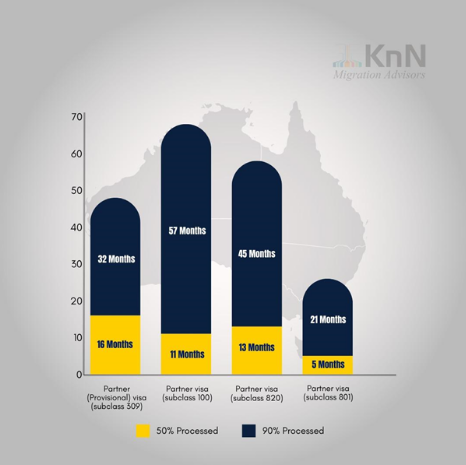Many migrants in Australia wish to reunite with their partners, yet numerous Partner Visa applications are denied every year. In this article Immigration Experts from KnN Migration will guide you through the essential information you should know for a successful application. We’ll explore the different types of partner visas, the critical “four pillars” of relationship evidence, and other important factors. Learn what it takes to secure your Partner Visa and join your loved one in Australia.
Types of Partnership Visas in Australia
Australia offers two main types of Partner Visas: the Offshore Partner Visa (apply overseas) and the Onshore Partner Visa (apply in Australia).
Partner Visa (apply overseas) includes:
- Subclass 309 (Provisional):
This temporary visa allows the partner or spouse of an Australian citizen, permanent resident, or eligible New Zealand citizen to live in Australia until the permanent Partner Visa (subclass 100) is granted.
- Subclass 100 (Migrant):
This permanent visa is granted to holders of the Subclass 309 visa, allowing them to live in Australia permanently.
Partner Visa (apply in Australia) includes:
- Subclass 820 (Temporary):
This visa allows the partner or spouse to live in Australia temporarily until the permanent Partner Visa (subclass 801) is granted.
- Subclass 801 (Permanent):
This visa grants permanent residency to holders of the Subclass 820 visa.
Eligibility for Different Partner Visas in Australia
Different partner visas in Australia have distinct eligibility requirements, particularly those for onshore and offshore applications. Health, Charecter and Age requirements are some common criteria for most of the visa streams.
Visa | Key Eligibility Criteria |
Subclass 100 |
|
Subclass 309 |
|
Subclass 820
|
|
Subclass 801
|
|
Cost and Stay Duration of Each Type of Partner Visa
Subclass 309 (Partner Visa – Temporary)
Cost: From AUD8,850.00 (as of May 2024)
Stay Duration: Temporary until the permanent Partner visa (subclass 100) application is finalized or withdrawn.
Subclass 100 (Partner Visa – Permanent)
Cost: Paid during the combined application for the temporary and permanent partner visas.
Stay Duration: Permanently.
Subclass 820 (Partner Visa – Temporary)
Cost: From AUD8,850.00 (as of May 2024) for most applicants. From AUD1,475 for Prospective Marriage visa (subclass 300) holders.
Stay Duration: Temporary until the permanent Partner visa (subclass 801) application is finalized or withdrawn.
Subclass 801 (Partner Visa – Permanent)
Cost: Paid during the combined application for the temporary and permanent partner visas.
Stay Duration: Permanently.
Processing Time of Different Partner Visas (as of May 2024)

4 Pillars of Partner Visa
The partner visa application process in Australia hinges upon four fundamental pillars that serve as the cornerstone for assessing the genuineness and validity of a relationship. These pillars encompass the financial aspects of the relationship, the nature of the household, the social dynamics between partners, and the depth of commitment they share. Understanding and fulfilling the criteria set within these pillars are important as they directly influence the success of a partner visa application..
Financial Aspects:
- This pillar scrutinizes the financial interdependence between partners, aiming to establish the genuineness and stability of their relationship.
- Key factors include shared ownership of assets like real estate, joint liabilities such as mortgages, and the pooling of financial resources through joint bank accounts or shared expenses.
- Documentary evidence like mortgage documents, joint bank account statements, and household bills in both names are crucial to demonstrate financial cohesiveness.
- Decision makers assess the extent to which partners are financially committed to each other, aiming to confirm a bona fide partnership beyond mere convenience.
Nature of the Household:
- This pillar examines the living arrangements and responsibilities within the shared household, providing insights into the practical aspects of the relationship.
- Factors considered include joint ownership or lease of residential property, shared responsibility for household chores, and caring for children if applicable.
- Evidence such as residential lease agreements, statements outlining the division of household tasks, and letters addressed to both partners at the same address help establish a stable domestic environment.
- Decision makers evaluate the extent to which partners share their lives domestically, seeking assurance of a committed and cohesive household unit.
Social Dynamics:
- This pillar focuses on the couple’s social integration and public representation of their relationship, assessing its visibility and acceptance within the broader community.
- Key elements include official declarations of the relationship to government bodies or institutions, joint participation in social activities, and endorsements from friends or family.
- Evidence like registration of the relationship, joint travel plans, and testimonials from acquaintances corroborate the couple’s social bond.
- Decision makers gauge the couple’s social involvement and acceptance, looking for indications of a genuine and recognized partnership beyond private interactions.
Commitment Level:
- This pillar evaluates the depth and longevity of the relationship, aiming to ascertain the partners’ emotional investment and future intentions.
- Factors considered include the duration of the relationship, mutual understanding of personal circumstances, and shared future plans.
- Documentary evidence like statements describing the relationship’s evolution, joint activities, and significant events help illustrate its progression and significance.
- Decision makers assess the partners’ commitment to each other, seeking assurance of a lasting and meaningful bond worthy of visa approval.
Top Reasons for Visa Refusal
Understanding the typical reasons for partner visa refusals empowers applicants to proactively strengthen their applications, increasing their odds of a favorable outcome. Seeking guidance from seasoned immigration lawyers or registered migration agents can provide invaluable support, offering reassurance throughout the visa journey.
- Insufficient Evidence: One of the primary reasons for partner visa refusals is the lack of comprehensive supporting documents. It’s essential to provide thorough evidence across all aspects of the relationship, including financial interdependence, household arrangements, and social commitment. Failing to present convincing evidence can lead to application rejection.
- Ineligibility: Applicants must meet specific eligibility criteria to qualify for a partner visa. This includes being in a genuine and committed relationship with an Australian citizen, permanent resident, or eligible New Zealand citizen spouse or de facto partner. Failure to meet these requirements can result in visa refusal.
- Failure to Meet Relationship Requirements: The Department of Home Affairs scrutinizes the nature of the relationship to ensure its authenticity. Whether through marriage, registration of a de facto relationship, or cohabitation for at least 12 months, demonstrating a genuine partnership is crucial. Applicants who fail to meet these relationship criteria may face refusal.
Additionally, providing inaccurate information or attempting to deceive immigration authorities can result in severe repercussions, including refusal and future application bans. Transparency and honesty are paramount throughout the entire application process.
FAQ:
Who is eligible for a partner visa in Australia?
To be eligible for a partner visa in Australia, an individual must be in a genuine and ongoing relationship with an Australian citizen, Australian permanent resident, or eligible New Zealand citizen.
What evidence is needed for a partner visa in Australia?
For an Australian partner visa, applicants need to provide evidence-based on four key pillars: financial aspects, nature of the household, social dynamics, and depth of commitment. Evidence may include joint bank statements, shared property ownership or rental agreements, utility bills, photographs, and social media interactions. Additionally, the relationship must be either a registered marriage, a registered de facto partnership, or a de facto relationship that has existed for at least 12 months.
is it possible to Converting visitor visa to partner visa?
Yes, it is possible to apply for a partner visa while in Australia on a visitor visa, though it is not a direct conversion. Applicants must meet the eligibility requirements for the partner visa, including being in a genuine relationship with an Australian citizen, permanent resident, or eligible New Zealand citizen. It’s essential to lodge the partner visa application before the visitor visa expires and ensure that all conditions of the visitor visa are adhered to during the application process.
Do you need ielts for partner visa Australia?
No, an IELTS exam is not required for a partner visa in Australia.
Can I live in Australia while waiting for a partner visa?
Yes, if you are in Australia lawfully when applying for a partner visa, you will typically be granted a Bridging Visa. This visa allows you to stay in Australia while your partner visa application is being processed. The Bridging Visa comes into effect once your current visa expires, ensuring you can remain in the country legally during the processing period.
Can a partner visa be rejected in Australia?
Yes, a partner visa in Australia can be rejected if the documentation is incorrect or if the case officer finds the relationship is not genuine. It is essential to provide comprehensive evidence across the four pillars: financial aspects, nature of the household, social dynamics, and depth of commitment. Incomplete or inconsistent documentation can lead to a negative assessment. Ensuring that all required documents are accurately prepared and demonstrating the authenticity and depth of the relationship through these key areas is essential for a successful application.
What is a subclass 300 visa in Australia?
The Subclass 300 visa, also known as the Prospective Marriage visa, allows individuals to come to Australia to marry their prospective spouse and then apply for a Partner visa. This visa typically allows a stay of 9 to 15 months from the date of grant and permits the holder to work and study in Australia. To be eligible, applicants must be 18 years old or older, have a sponsor who is an Australian citizen, permanent resident, or eligible New Zealand citizen, intend to marry their prospective spouse before the visa period ends, and be outside of Australia when applying for the visa.
Why choose a MARA Agent
When it comes to applying for a partner visa, opting for the expertise of a MARA (Migration Agents Registration Authority) agent can prove invaluable. The intricacies of immigration laws and procedures can be daunting for individuals to navigate alone. MARA agents bring a wealth of knowledge and experience to the table, ensuring that every aspect of the application process is handled with precision and accuracy. One of the most critical aspects where MARA agents excel is in communication with the Department of Home Affairs. Timely and clear communication is vital throughout the application process to avoid missed deadlines or overlooked document requests, which could lead to visa refusal. Additionally, MARA agents prioritize transparency and accuracy to prevent any misrepresentation or fraud in the application, safeguarding applicants from severe consequences. By entrusting their partner visa application to a MARA agent, individuals can gain peace of mind, knowing that their case is in capable hands, and increase their chances of a successful outcome.


